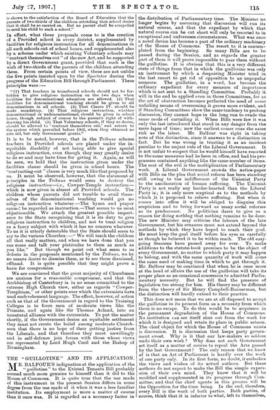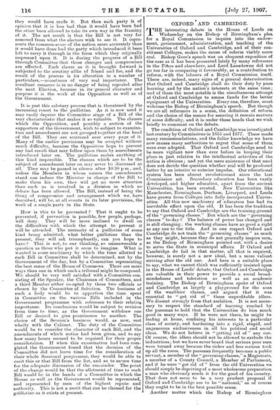THE " GUILLOTINE " AND ITS APPLICATION.
MR. BALFOUR'S indignation at the application of the " guillotine " to the Evicted Tenants Bill probably seemed much more genuine to himself than it did to the House of Commons. It is quite true that the use made of this instrument in the present Session differs in some degree from the use made of it when it was a less familiar institution. Its employment is more a matter of course than it once was. It is regarded as a necessary factor in the distribution of Parliamentary time. The Minister no longer begins by assuming that discussion will run its natural course, and that the expedient by which that natural course can be cut short will only be resorted to in exceptional and unforeseen circumstances. What was once a novel device has become a part of the ordinary machinery of the House of Commons. The resort to it is contem- plated from the beginning. So many Bills are to be passed during the Session, and as regards the greater part of them it will prove impossible to pass them without the guillotine. It is obvious that this is a very different state of things from that in which the guillotine was only an instrument by which a despairing Minister tried in the last resort to get rid of opposition to an unpopular measure. The guillotine, in a word, has become the ordinary expedient for every measure of importance which is not sent to a Standing Committee. Probably it will in the end be applied even in those Committees, for as the art of obstruction becomes perfected the need of some unfailing means of overcoming it grows more evident, and if Standing Committees show the same tendency to prolong discussion, they cannot hope in the long run to evade the same mode of curtailing it. When Bills were few it was only the last introduced that stood in any danger from the mere lapse of time; now the earliest comer runs the same risk as the latest. Mr. Balfour was right in taking note of this distinction, since it answers to a distinction in fact. But he was wrong in treating it as an incident peculiar to the unjust rule of the Liberal Government. It is not unfair to suspect that he would himself have resorted to the same measures had he been in office, and had his pro- gramme contained anything like the same number of items. The seat of the evil is the multiplication of Parliamentary work. A Liberal Government crowds the notice-paper with Bills on the plea that social reform has been standing still owing to the indifference of the Unionist Party to the amelioration of human suffering. The Unionist Party is not really any harder-hearted than the Liberal Party is ; it is only more sceptical as to the methods by which it is proposed to relieve suffering. But when it comes into office it will be obliged to disguise this scepticism and to bring forward as many social reforms as its predecessor. No politician dares to give as a reason for doing nothing that nothing remains to be done. The new Minister may criticise the labours of the late Government, but his censures must not extend beyond the methods by which they have hoped to reach their goal. He must keep the goal itself before his eyes as carefully as though he believed it to be within reach. The old easy- going Sessions have passed away for ever. To make additions to the statute-book promises to be the object of every Government, no matter to which party it may happen to belong, and with the same quantity of work will come the same need of making time in which to get through it. Mr. Balfour may be convinced that when he is once more at the head of affairs the use of the guillotine will take its proper place as an occasional concession to admitted Parlia- mentary necessity. But he will find the pressure of legislation too strong for him. His theory may be different from the theory of Sir Henry Campbell-Bannerman, but the distinction will hardly extend to their practice.
This does not mean that we are at all disposed to accept the guillotine in its present form as a necessity from which there is no escape. To do this would be to acquiesce in the permanent degradation of the House of Commons. No institution can see itself shut out from the work for which it is designed and retain its place in public esteem. The chief object for which the House of Commons exists is discussion. It is discussion that keeps party govern- ment sweet. Why is it that our law-makers so seldom undo their own work ? Why does not each Government set itself as a matter of course to repeal the Acts passed by the last Government? The only reason that we know of is that an Act of Parliament is hardly ever the work of one party only. In its first form, no doubt, it embodies the views and wishes of its actual authors. But these authors do not expect to make the Bill the simple expres- sion of their own mind. They know that it will be modified and supplemented in its progress through Com- mittee, and that the chief agents in this process will be the Opposition for the time being. In the end, therefore, every Bill is the work of both parties. Both parties, of course, think that it is inferior to what, left to themselves, they would have made it. But then each party is of opinion that it is less bad than it would have been had the other been allowed to take its own way in the framing of it. The net result is that the Bill is not very far removed from what the electors wish to see it. It repre- sents the common-sense of the nation more accurately than it would have done had the party which introduced it been left to carry it through in the form which they originally impressed upon it. It is during the progress of a Bill through Committee that these changes and compromises are effected. Each clause as it is brought forward is subjected to the scrutiny alike of friend aud foe, and the result of the process is its alteration in a number of particulars,—sometimes of very real importance. The resultant measure is in no danger of being repealed after the next Election, because in its •general character and purpose it is the work of the Opposition as well as of the Government.
It is just this salutary process that is threatened by the increasing resort to the guillotine. As it is now used it may easily deprive the Committee stage of a Bill of the very characteristic that makes it so valuable. The clauses which the Opposition, and possibly a section of the supporters of the Government, wish to subject to examina- tion and amendment are not grouped together at the head of the Bill. They are scattered over every page of it. Many of the earlier provisions may be accepted without much difficulty, bemuse the Opposition hope to prevent any bad result that may follow upon them by amendments introduced later on. The guillotine makes anything of this kind impossible. The clauses which are to be the subject of amendment later on may never be discussed at, all. They may be passed in silence after 10.30 p.m., and, unless the Members in whose names the amendments stand can induce the Minister in charge of the Bill to make them his own, they will get no more attention than such as is involved in a division in which no debate has been allowed. The Bill, instead of being the thing of compromise and arrangement which we, have described, will be, at all events in its later provisions, the work of a, single party in the State.
How is this to be prevented ? That it ought to be prevented, if prevention is possible, few people, perhaps, will deny. They will be more inclined to dwell on the difficulties with which the attempt to prevent it will be attended. The necessity of a guillotine of some kind being admitted, what better guillotine than the present, they will ask triumphantly, can you hope to ham? This is not, to our thinking, so unanswerable a question as those who put it seem to imagine. What is wanted is some machinery by which the time allotted to each Bill in Committee shall be determined, not by the Government of the day, but by a Committee representing the best sense of the House of Commons. There are more ways than one in which such a tribunal might be composed. We should be very well satisfied with a Committee con- sisting of the Speaker, the Chairman of Committees, and a third Member either co-opted by these two officials or chosen' by the Committee of Selection. The business of such a body would be to apportion the time spent in Committee on the various Bills included in the Government programme with reference to their relative importance. Its conclusions would be subject to revision from time to time, as the Government withdrew one Bill or desired to give prominence to another. The choice of the Session's business would, as now, rest wholly with the Cabinet. The duty of the Committee would be to consider the character of each Bill, and the amendments of which notice had been given, and to say bow many hours seemed to be required for their proper consideration. If when this examination had been com- illeted the Government found that the decision of the Committee did not leave time for the consideration of their whole Sessional programme, they would be able to omit this or that Bill from the list, and so to secure time for the adequate discussion of the remainder. The point of the. change would be that the allotment of time to each Bill would be in the hands of a Committee in which the House as well as the Govermnent would be represented, and represented by men of the highest repute and authority. This is not a merit that can be claimed for the guillotine as it exists at present.







































 Previous page
Previous page